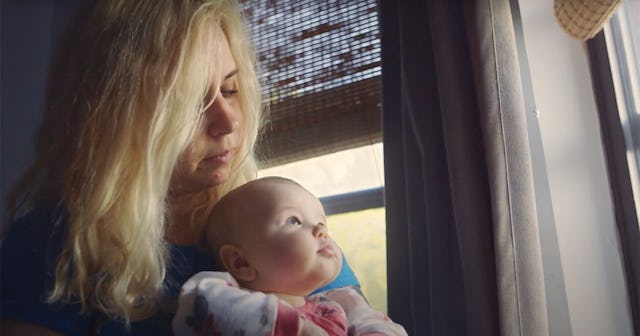'Year One' Is A Powerful Deep Dive Into The Darkness Of Motherhood

Trigger warning: suicide ideation
If you’ve ever experienced postpartum depression, anxiety, OCD, or another perinatal mood disorder, you know how crippling these conditions can be. I was diagnosed with PPD in the fall of 2013 and didn’t emerge from the proverbial darkness until the summer of 2014, nearly 16 months after giving birth. This means that, for a full year, I was flailing and failing. On numerous occasions, I wanted to die.
While mental health disorders have been destimagatized in recent years, maternal mental health disorders are still very misunderstood. After all, you just gave birth to a beautiful baby; these are supposed to be the best days of your life. You should be joyous, soaring on (an adrenaline-filled) cloud nine.
But what happens when you aren’t? A new documentary aims to explore that question and more. “Year One” follows writer and filmmaker Erin Bagwell on her journey to and through the first year of motherhood.
“When I create or produce a documentary, I do so from a place of ‘seeking,’ meaning I start the project with a question and the film allows me to seek out an answer,” Bagwell tells Scary Mommy. “I knew I wanted to make a film about motherhood, but I didn’t know what that would look like until I became a mother. I felt compelled to create a film about the identity shifts that take place. But then, in the early stages of filming, I was diagnosed with postpartum depression. It was a profound experience and eventually became the throughline of the film, as I sought ways to grow. To mend. To heal.”
“The first few weeks postpartum were unlike anything I had ever experienced before,” Bagwell explains in the film. “I was so focused on surviving that it took me a really long time to bond with Ginny. Everything I read said this was ‘normal.’ But when friends and family were telling me to enjoy every minute, it made me feel like I was already failing. I thought maybe I’d made a mistake,” Bagwell adds. “Maybe I didn’t have what it takes to be a mom.”
Of course, Bagwell is not (and was not) the first person to feel this way, nor will she be the last. Many parents struggle to bond with their children. Moms — and dads — are meeting a new person, after all. They must form a relationship from the ground up. They also feel inadequate, questioning every decision they do or don’t make. But it’s one of those things we don’t talk about, like struggling to feed or breastfeed or simply dealing with endless hours of screaming on little to no sleep. Yeah. New parenthood is hard. And if you add hormonal shifts to the mix and a chemical imbalance, it’s damn near impossible. Raising a child while living with a perinatal mood disorder defies the odds.
“Some days it is hard to breathe,” Bagwell explains in “Year One.” “I feel like I’m running and I can’t stop crying and I feel so much guilt. Like somehow I should be stronger or more grateful.” But postpartum depression robbed Bagwell of these feelings. It made her sad and apathetic. She was anxious and overwhelmed. And Bagwell felt this way until she hit what she describes as “rock bottom.”
“I couldn’t control the darkness and overwhelm inside of me,” Bagwell said. “I thought maybe my daughter would be better off without me. I thought about killing myself.”
The good news is Bagwell didn’t, as I didn’t. We both turned to our husbands for help. In reaching out, we found hope. And we both sought external support. Bagwell turned to peer groups, and I turned to a psychologist and psychiatrist. With therapy and medication, I was able to manage my mood. But you don’t have to hit “rock bottom” to get better.
“I think education is a big part of understanding, treating, and preventing PMADs (or perinatal and postpartum mood and anxiety disorders),” Bagwell tells Scary Mommy. “The more people know about PMADs, the better off they will be.” Knowledge can also help you ask for help
“When my postpartum depression started to get worse, I was afraid to ask for help because in the back of my mind I was afraid someone would take my daughter away,” Bagwell adds. “We have this horrible myth in our culture that postpartum depression equates to harming your baby, but the truth is harming your baby is actually a symptom of postpartum psychosis that is very rare and only occurs in 1 to 1000 mothers.”
The symptoms of postpartum and perinatal mood disorders vary, from anger and apathy to sadness, irritability, uncontrolled crying, anxiety, and/or feeling numb. A loss of interest is also a common sign something is wrong as are unwanted thoughts and unchecked fears.
“Year One” will be released on May 4. The film can be viewed online on YouTube and/or on the documentary’s official webpage.
If you or someone you know is experiencing symptoms of postpartum depression, anxiety, OCD and/or another perinatal mood disorder, realize there is help and hope. For immediate assistance, contact your physician, OB/GYN and/or call 911 or reach out to someone at Postpartum Support International at 1-800-944-4773.
This article was originally published on